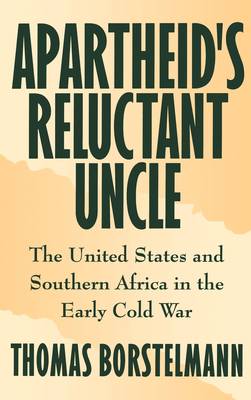
- Afhalen na 1 uur in een winkel met voorraad
- Gratis thuislevering in België vanaf € 30
- Ruim aanbod met 7 miljoen producten
- Afhalen na 1 uur in een winkel met voorraad
- Gratis thuislevering in België vanaf € 30
- Ruim aanbod met 7 miljoen producten
Zoeken
Apartheid's Reluctant Uncle
The United States and Southern Africa in the Early Cold War
Thomas Borstelmann
Hardcover | Engels
€ 220,45
+ 440 punten
Omschrijving
In 1948, civil rights for black Americans stood higher on the national political agenda than at any time since Reconstruction. President Harry Truman issued orders for fair employment and the integration of the armed forces, and he proceeded to campaign on a platform that included an unprecedented civil rights plank, pushed through the Democratic convention by Hubert Humphrey. But on the other side of the globe, his administration paid close attention to another election as well: the surprising triumph of the white-supremacist National Party in South Africa, reluctantly accepted by the Truman White House.
Apartheid's Reluctant Uncle brings to light the neglected history of Washington's strong (but hushed) backing for the National Party government after it won power in 1948, and its formal establishment of apartheid. Thomas Borstelmann's account weaves together the complex threads of early Cold War tensions, African and domestic American politics, and nuclear diplomacy to show how--and why--the United States government aided and abetted the evangelically racist regime in Pretoria. Despite the rhetoric of the "free world," and the lingering idealism following the defeat of Nazi Germany and the founding of the U.N., Truman's foreign policy was focused on limiting Soviet expansion at all costs. Tensions between the two former allies mounted in Europe, the Middle East, and Asia, with the Berlin crisis, the Greek civil war, and the impending victory of the Communists in China. In southern Africa, the United States sought to limit Soviet and left-wing influence by supporting the colonial powers (Belgium, Portugal, and of course Britain) and the fiercely anticommunist National Party, led by Daniel Malan. Despite the unsavory racism of Malan's government--Borstelmann shows that Pretoria fomented violence among black groups in the late 1940s, just as it has done recently between the ANC and Inkatha--the U.S. saw South Africa as a dependable and important ally. In addition, America was almost completely dependent on southern Africa for its uranium supply, and was willing to go to great lengths to secure the critical fuel for its nuclear arsenal. Borstelmann also notes that race relations in the segregated U.S. played a role in Washington's policies, with few white Americans greatly disturbed by the establishment of apartheid.
As South Africa finally nears an end to almost fifty years of formal apartheid (and as Truman nears canonization, following the recent presidential election), Borstelmann's account comes as a startling reminder of America's early links to Pretoria's racist system. Intensively researched in the files of the Truman Library, the National Security Council, and the departments of Defense and State, Apartheid's Reluctant Uncle provides fascinating insight into a most revealing episode in American policymaking.
Apartheid's Reluctant Uncle brings to light the neglected history of Washington's strong (but hushed) backing for the National Party government after it won power in 1948, and its formal establishment of apartheid. Thomas Borstelmann's account weaves together the complex threads of early Cold War tensions, African and domestic American politics, and nuclear diplomacy to show how--and why--the United States government aided and abetted the evangelically racist regime in Pretoria. Despite the rhetoric of the "free world," and the lingering idealism following the defeat of Nazi Germany and the founding of the U.N., Truman's foreign policy was focused on limiting Soviet expansion at all costs. Tensions between the two former allies mounted in Europe, the Middle East, and Asia, with the Berlin crisis, the Greek civil war, and the impending victory of the Communists in China. In southern Africa, the United States sought to limit Soviet and left-wing influence by supporting the colonial powers (Belgium, Portugal, and of course Britain) and the fiercely anticommunist National Party, led by Daniel Malan. Despite the unsavory racism of Malan's government--Borstelmann shows that Pretoria fomented violence among black groups in the late 1940s, just as it has done recently between the ANC and Inkatha--the U.S. saw South Africa as a dependable and important ally. In addition, America was almost completely dependent on southern Africa for its uranium supply, and was willing to go to great lengths to secure the critical fuel for its nuclear arsenal. Borstelmann also notes that race relations in the segregated U.S. played a role in Washington's policies, with few white Americans greatly disturbed by the establishment of apartheid.
As South Africa finally nears an end to almost fifty years of formal apartheid (and as Truman nears canonization, following the recent presidential election), Borstelmann's account comes as a startling reminder of America's early links to Pretoria's racist system. Intensively researched in the files of the Truman Library, the National Security Council, and the departments of Defense and State, Apartheid's Reluctant Uncle provides fascinating insight into a most revealing episode in American policymaking.
Specificaties
Betrokkenen
- Auteur(s):
- Uitgeverij:
Inhoud
- Aantal bladzijden:
- 320
- Taal:
- Engels
Eigenschappen
- Productcode (EAN):
- 9780195079425
- Verschijningsdatum:
- 24/06/1993
- Uitvoering:
- Hardcover
- Formaat:
- Genaaid
- Afmetingen:
- 162 mm x 241 mm
- Gewicht:
- 594 g

Alleen bij Standaard Boekhandel
+ 440 punten op je klantenkaart van Standaard Boekhandel
Beoordelingen
We publiceren alleen reviews die voldoen aan de voorwaarden voor reviews. Bekijk onze voorwaarden voor reviews.











